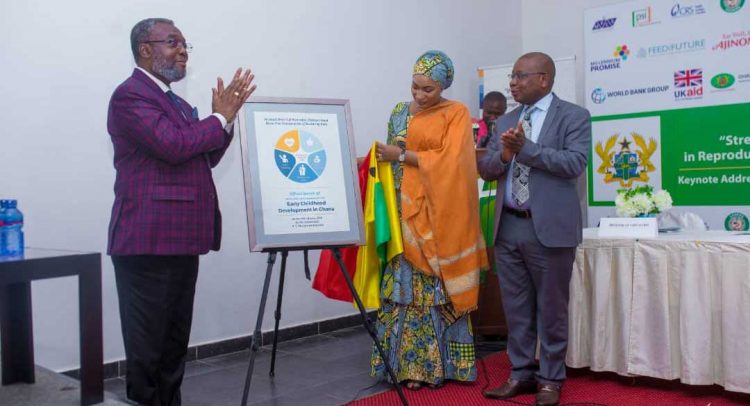Samira Bawumia speaking at the event
Wife of the Vice President, Samira Bawumia, has added her support to efforts aimed at raising awareness on the importance of early childhood development as a crucial key to a full and productive life for every Ghanaian child.
Officially launching the Nutrition Care Framework for Early Childhood Development in Accra, Mrs Bawumia lauded the effort of health agencies and development partners for developing the framework, which is to ensure proper childhood nutrition.
She pointed out that giving equally importance and investing in early childhood development is necessary to uphold the right of every child to survive and thrive.
“Investing in early childhood development is one of the best investments a country can make to boost economic growth, promote peaceful and sustainable societies and eliminate poverty and inequality,” she reiterated.
Mrs Bawumia further highlighted that all children need nurturing care to develop their full potential as it is vital for healthy growth and development.
“Nurturing care does not only promote physical, emotional, social and cognitive development, it also protects young children from worst effects of adversity. It produces lifelong and intergenerational benefits for health, productivity and social cohesion,” she said.
She, thus, emphasized her commitment to support the full implementation of the framework countrywide.
The Minister of Health, Kwaku Agyeman-Manu, stated that the country has over the years initiated programmes and policies aimed at strengthening healthcare delivery for mother and their babies while removing the financial barriers to healthcare.
He said through interventions like the community-based health planning and services (CHPS), National Health Insurance Scheme (NHIS) and paid maternity leave, women can go through pregnancy successfully and have time to bond with their babies during essential first months of life.
Mr Agyeman-Manu, however, added that without inventions like the Nutrition Care Framework for Early Childhood Development to boost government’s efforts, the country’s future may face the long-term consequences of poor childhood nutrition, including lower cognitive, language and psychosocial outcomes.
“Adults affected by adversity in early childhoods are estimated to earn almost a third less than the average adult income in the country. These individual cost add up, constraining wealth creation and national earnings,” he pointed out.
In a panel discussion moderated by the Director General of the Ghana Health Service (GHS), Dr Anthony Nsiah-Asare, development partners pledged their continuous support to the strengthening of the country’s health system.
By Jamila Akweley Okertchiri


